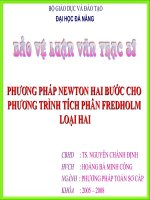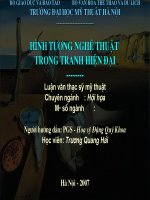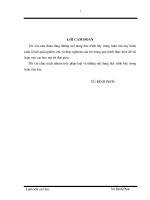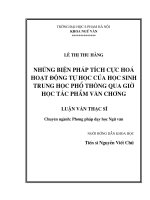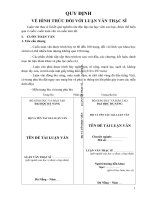(Luận văn thạc sĩ) lexical and structural ambiguity in treasure island by robert louis stevenson
Bạn đang xem bản rút gọn của tài liệu. Xem và tải ngay bản đầy đủ của tài liệu tại đây (442.32 KB, 6 trang )
VIETNAM NATIONAL UNIVERSITY, HANOI
UNIVERSITY OF LANGUAGES AND INTERNATIONAL STUDIES
FALCUTY OF POST- GRADUATE STUDIES
NGUYỄN DIỆU LINH
LEXICAL AND STRUCTURAL AMBIGUITY IN
“TREASURE ISLAND” BY ROBERT LOUIS STEVENSON
(Sự mơ hồ nghĩa từ vựng và cấu trúc trong
truyện “Đảo giấu vàng” của Robert Louis Stevenson)
M.A. Minor Programme Thesis
English Linguistics
60.22.15
HANOI- 2011
VIETNAM NATIONAL UNIVERSITY, HANOI
UNIVERSITY OF LANGUAGES AND INTERNATIONAL STUDIES
FALCUTY OF POST- GRADUATE STUDIES
NGUYỄN DIỆU LINH
LEXICAL AND STRUCTURAL AMBIGUITY IN
“TREASURE ISLAND” BY ROBERT LOUIS STEVENSON
(Sự mơ hồ nghĩa từ vựng và cấu trúc trong
truyện “Đảo giấu vàng” của Robert Louis Stevenson)
M.A. Minor Programme Thesis
Field
: English Linguistics
Code
: 60.22.15
Supervisor
: Assoc. Prof. Dr. Lê Hùng Tiến
HANOI- 2011
4
TABLE OF CONTENTS
DECLARATION .............................................................................................................. i
ACKNOWLEDGEMENTS ............................................................................................. ii
ABSTRACT ....................................................................................................................... iii
TABLE OF CONTENTS ................................................................................................. iv
ABBREVIATION ............................................................................................................. vi
PART A: INTRODUCTION ........................................................................................... 1
1. Rationale .................................................................................................................... 1
2. Aim of the Study ........................................................................................................ 1
3. Scope and method of the study .................................................................................. 2
4. Organization of the study ........................................................................................... 2
Part B: DEVELOPMENT................................................................................................ 4
CHAPTER 1: LITERATURE REVIEW ..................................................................... 4
1.1. Basic Concepts of English Ambiguity .................................................................... 4
1.1.1. Definition of Ambiguity....................................................................................... 4
1.1.2. Differences between Ambiguity and Vagueness ................................................. 5
1.2. Cases of Ambiguity ................................................................................................. 5
1.2.1. Lexical Ambiguity ........................................................................................... 6
1.2.1.1. Ambiguity caused by Homonymy and Polysemy ................................... 7
1.2.1.2. Ambiguity caused by Obscure References .............................................. 10
1.2.1.3. Ambiguity caused by Intensions and Extensions .................................... 11
1.2.2. Structural Ambiguity ....................................................................................... 12
1.2.3. Semantic scope ambiguity ............................................................................... 13
1.2.4. Phonological Ambiguity.................................................................................. 14
1.3. Ambiguity and Literature ........................................................................................ 14
1.4. Summary ................................................................................................................. 16
CHAPTER 2: LEXICAL AND STRUCTURAL AMBIGUITY IN “TREASURE
ISLAND” ........................................................................................................................... 17
2.1. Lexical ambiguity.................................................................................................... 17
2.1.1. Metaphor ......................................................................................................... 17
5
2.1.2. Metonymy ....................................................................................................... 22
2.1.3. Idioms .............................................................................................................. 27
2.2. Structural ambiguity ................................................................................................ 28
2.2.1. Comparative clause ......................................................................................... 28
2.2.2. Relative clause ................................................................................................. 29
2.2.3. Modification of adjective ................................................................................ 30
2.2.4. Prepositional phrases ....................................................................................... 31
2.2.4.1 Adjectival phrase ...................................................................................... 31
2.2.4.2. Adverbial clause ...................................................................................... 32
2.3. Data analysis and findings ...................................................................................... 34
2.4. Summary ................................................................................................................. 35
PART C: CONCLUSION ................................................................................................ 36
1. Summary of the study ................................................................................................ 36
2. Some implications for teaching foreign languages to Vietnamese learners .............. 36
3. Limitations and suggestions for further studies ......................................................... 37
REFERENCES.................................................................................................................. I
Họ và tên
: Nguyễn Diệu Linh
Sinh ngày
: 21- 01- 1986
Học viên khóa
: 18
Chun ngành
: Ngơn Ngữ Anh
Tên đề tài luận văn : Lexical and Structural ambiguity in “Treasure Island” by Robert Louis
Stevenson
Giáo viên hướng dẫn: PGS. TS. Lê Hùng Tiến
Số điện thoại
: 091 508 6559
:
ABSTRACT
Ambiguity is one of the interesting aspects of language. Not only can it make interlocutors
or readers misunderstand but it is also an effective tool to make literature works attractive.
Therefore, it has received many concerns from linguists.
This study in Semantics attempts to investigate lexical and structural ambiguity in
“Treasure Island” by Robert Louis Stevenson. This investigation is carried out to answer the
question: “What are the roles of lexical and structural ambiguity in “Treasure Island” by Robert
Louis Stevenson?”. The theoretical framework for the analysis is set out by reviewing lexical and
structural ambiguity discussed by different linguists, and focusing on the point of view of
Hurford, J.R. & Heasley, B. (1983) who share the same idea as Palmer, F. R. (1981) and Cann,
R. (1983). Each chapter is gone deeply inside to find out and analyzed its lexical and structural
ambiguity, then, the data are grouped based on the literature review. From the data analysis, the
roles of lexical and structural ambiguity in the story are proposed. The results show that lexical
and structural ambiguity appears in most chapter and they play important roles in the attraction
of the story. The findings from the analysis are also aimed at helping readers to clarify ambiguity
which they may have to face up with when reading the story.
BẢN TỐT YẾU
Sự mơ hồ là một trong những khía cạnh đặc sắc của ngơn ngữ. Nó khơng chỉ có thể khiến
những người tham gia đàm thoại hiểu lầm mà cịn là cơng cụ hữu hiệu để làm cho các tác phẩm
văn học hấp dẫn. vì thế, nó đã nhận được nhiều sự quan tâm từ các nhà ngôn ngữ.
Bài nghiên cứu về lĩnh vực Ngữ Nghĩa học này điều tra về sự mơ hồ nghĩa từ vựng và cấu
trúc trong truyện “Đảo Giấu Vàng” của Robert Louis Stevenson. Bài nghiên cứu này được tiến
hành để trả lời câu hỏi: “Sự mơ hồ nghĩa từ vựng và cấu trúc có vai trị gì trong truyện “Đảo
Giấu Vàng” của Robert Louis Stevenson?”. Lý thuyết cho phần phân tích được đặt ra bằng cách
xem xét lại sự mơ hồ nghĩa từ vựng và cấu trúc mà các nhà ngôn ngữ khác nhau đã đề cập tới, và
tập trung theo quan điểm của Hurford, J.R. & Heasley, B. (1983) là những người có cùng quan
điểm với Palmer, F. R. (1981) và Cann, R. (1983). Mỗi chương được đi sâu để tìm hiểu và phân
tích sự mơ hồ nghĩa từ vựng và cấu trúc, sau đó, số liệu được nhóm lại dựa theo lý thuyết. Từ
việc phân tích số liệu, vai trị của sự mơ hồ nghĩa từ vựng và cấu trúc trong truyện sẽ được đưa
ra. Các kết quả chỉ ra rằng sự mơ hồ nghĩa từ vựng và cấu trúc xuất hiện ở hầu hết các chương và
có vai trị quan trọng trong việc tạo ra sự hấp dẫn của truyện. Kết quả thu được từ việc phân tích
cũng nhằm giúp độc giả hiểu rõ về sự mơ hồ mà họ có thể gặp phải khi đọc truyện.
